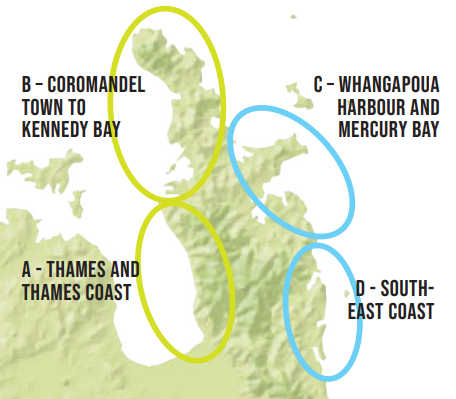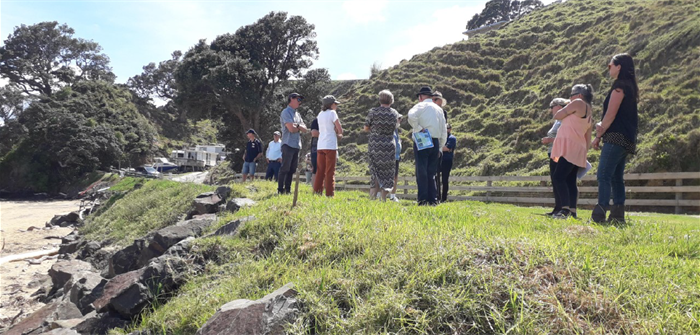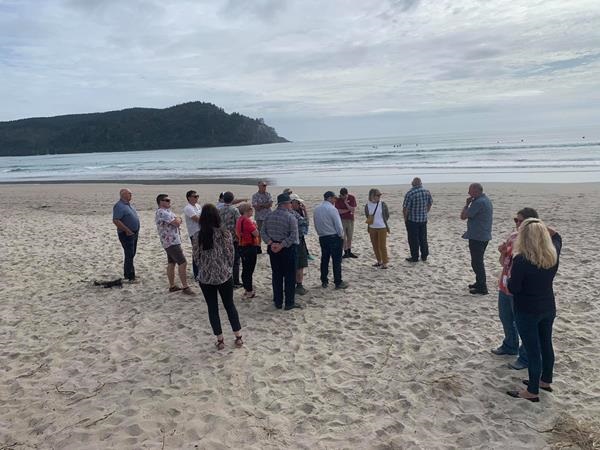Coastal Panels
This is a new phase in what is a major coastal management project, defining the flooding and erosion risks to people and the social, cultural, economic and natural environment across all parts of our coastline over the next century and beyond.

Our Council approved for Coastal Panels to be set up to cover our coastline in the following areas (see map above):
Thames and Thames Coast Coromandel Town Coast to Kennedy Bay Whangapoua Harbour and Mercury Bay South-East Coast
Panels are advisory boards, made up of Community Board representatives, citizens, iwi, local businesses and asset owners, and it's intended they provide a fair and balanced representation of the relevant viewpoints about our coastal environment.
Panels work together to identify the risks on their local coasts and propose policies and actions to address these as they work through the development of the SMP for their area.
The panels will have access to the relevant expertise required along the way and will be guided by a sequence of steps and key questions set out by the Ministry for the Environment.
These include:
- What is happening on the coast?
- What matters most?
- What can we do about it and how can we get it done?
- Is it working?
At the end of the process, panels will make recommendations to our Council on how its community can prepare for and adapt to coastal change.
“Coastal Panels will be the engine for our Shoreline Management Plan project, which is all about building resilient coastal communities,” says our Mayor Sandra Goudie.
“This is a critical new step in the project, and I look forward to our communities getting involved and working together to come up with community-led, coastal adaption solutions,” she says.
Each Coastal Panel will have a membership made up of:
- Mana whenua representatives (up to four)
- Community Board representatives (two members)
- Community organisations (two members)
- Citizens (up to six members)
- Businesses (two members)
Councillors from our Council and Waikato Regional Council will be invited to be observers on the panels.
It’s intended that the panels will be balanced and representative of diverse views and of the community within the relevant SMP area.
Coastal Panels hit the road for our Shoreline Management Plan project (October 2020)

(Pictured above: A site visit by the coastal panel for Coromandel Town Coast to Kennedy Bay)
Members of our new Coastal Panels have now toured our district, looking at areas of current and future risk of coastal inundation, erosion and sea level rise.
The site visits followed on from the initial orientation workshop last month, where coastal panellists came together as they start working as advisors on our Shoreline Management Plan (SMP) project, which is all about helping our communities and coasts adapt to hazards.
Ultimately, this three-year project will lead to the development of SMPs for the entire length of our coastline, including our offshore islands.
“The project is all about helping our communities and coasts adapt to coastal hazards through site-specific plans," Mayor Sandra says.
“It's is an important journey we are embarking on together - one that will be made up of many small steps along the way. I look forward to the panels working with us as we come up with community-led adaptive solutions,” she says.
Our coastal visits allowed panel members to visit current coastal hazard spots in the areas they represent. This provided an opportunity to see things first-hand and begin to understand what communities value about the coast.
The site visits were led by our coastal scientist and included Council staff, our SMP project international consultants Royal HaskoningDHV, iwi, community board members and Councillors, Waikato Regional Council and NZTA.
(Below is a picture of the site visit to Whangamatā main beach by the surf club)

“The tours were a valuable way for panellists to orientate themselves with sites in their communities that are an issue,” says our Council's SMP project manager Amon Martin.
“This sets the scene well for the work ahead, where input from our panels will help build our understanding of how flooding and erosion will impact on the social, cultural, economic and natural environment across all parts of our coastline over the next century and beyond.”
Thames ward Councillor Martin Rodley joined the panels on three tours, and says they were a useful way to see the different issues around the Coromandel.
"We saw everything from cliffs to flat beaches, surf beaches, dunes restoration work, estuaries, road dropouts, inundation, erosion and had conversations with several locals who came out to make sure we knew what the local concerns were," Mr Rodley says.
"The panels carry hugely valuable local knowledge, which we'll need to make use of for this project to really make a difference."
Victoria Spence, panel member for the south-east coast, says the site visits around Whangamata, Pauanui and Tairua were very informative.
"It was fantastic to see the level of passion and knowledge the people on the panel are bringing to the project," Victoria says. "There are members who have been watching the environment for decades and people who are specialists in their field giving up their time to come on the panel.
"All kinds of wisdom and knowledge are included, from academics to those who have grassroots awareness of their environment and a deep sense of connection and desire to protect it," she says.